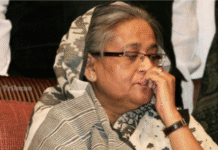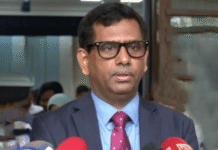‘It won’t interfere in any political matter’

Deputy Managing Director of International Monetary Fund (IMF) Naoyuki Shinohara on Wednesday said here that his organisation will continue to work closely with the present government to support policies and reform-oriented works to safeguard macroeconomic and financial stability.
Responding to a question on political issues at a press briefing at the Bangladesh Bank conference room about his visit to Bangladesh, the IMF official said his organisation would not interfere in any political matter.
“Of course, political stability is an important issue. But we don’t interfere in political affairs. We stick to general position,” he said.
Shinohara further said, “How the political consensus could be built or created within the country, it’s up to your to decide”.
He said the commitment of the government needs to be supported by a strong political consensus on many issues.
Naoyuki Shinohara, who met Prime Minister Sheikh Hasina and Finance Minister AMA Muhith during his visit, said the visit is part of his planned regular visit which was supposed to take place last year.
Appreciating Bangladesh’s achievements and growth, he said it needs to be continued the efforts on several fronts to ensure sustainable and inclusive growth.
“Tax collection needs to be stepped up to create more space for prioritized social and development spending. Further bringing down the cost of inefficient and regressive energy subsidies will also create a room to boost spending on well-targeted social safety nets to protect the poor,” he said.
Shinohara said he has been impressed with the government’s determination to transform Bangladesh into a middle-income country with sustainable and equitable opportunities for all.
He observed Bangladesh has had a remarkable economic and social performance over the past two decades, with significant poverty reduction and low, stable levels of inequality.
Shinohara said the country has now got a stronger external and domestic position, with international reserves more than twice the low levels of late 2011.
Source: UNB









